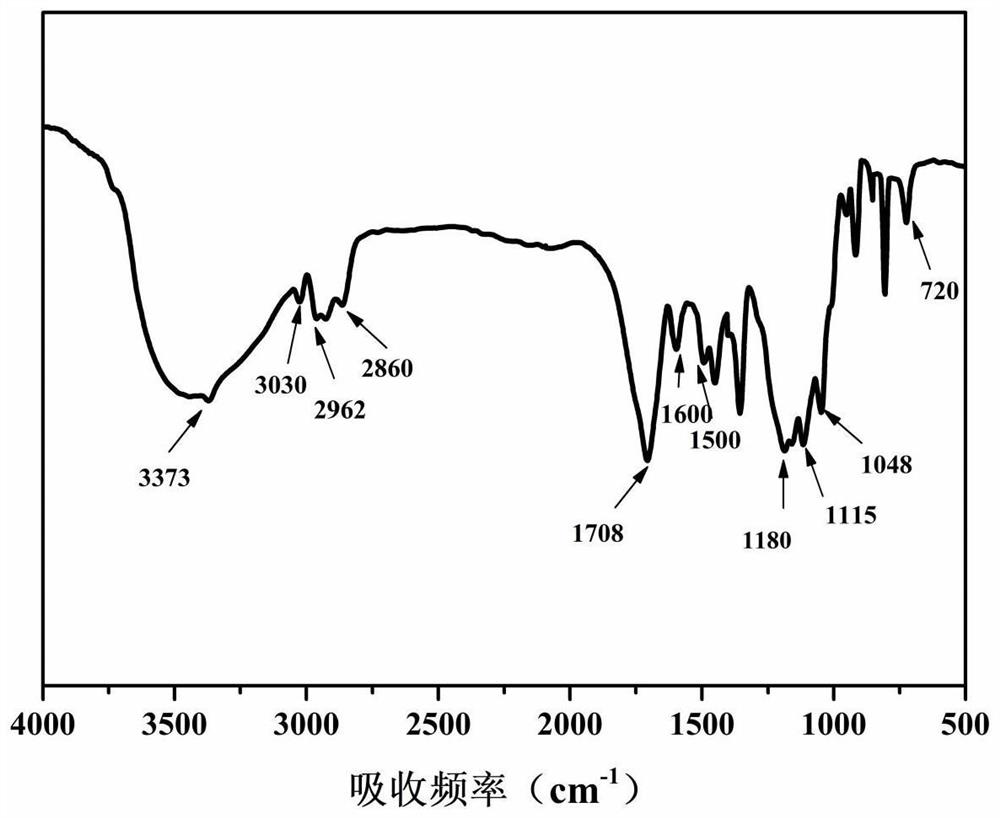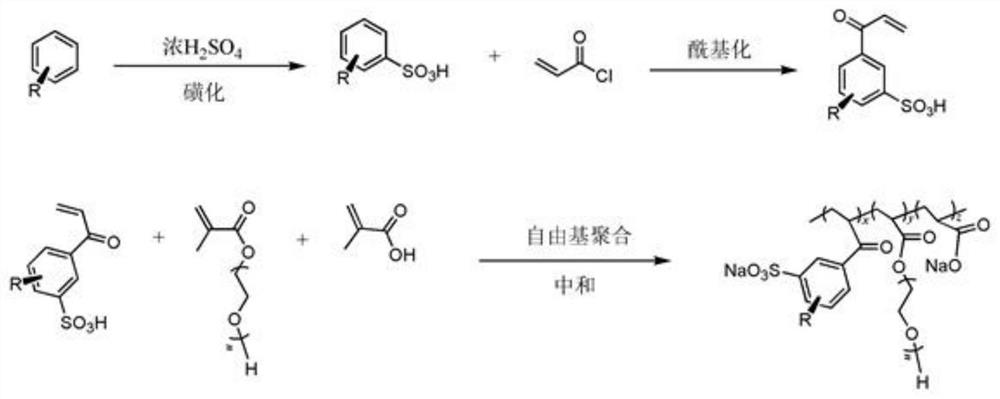Method for preparing polyether polycarboxylic acid type high-efficiency water reducing agent from polyethylbenzene tower bottom high-boiling residues
A technology of polyether polycarboxylic acid and high-efficiency water reducer, which is applied in the direction of sulfonic acid preparation, chemical instruments and methods, physical/chemical process catalysts, etc., can solve the problems of high industrialization cost, large amount of benzene, and high impurity content in products. Achieve good industrial application prospects, improve water reducing performance, and improve the effect of water reducing rate
- Summary
- Abstract
- Description
- Claims
- Application Information
AI Technical Summary
Problems solved by technology
Method used
Image
Examples
Embodiment 1
[0036] Step 1) At 25°C, add 50g of polyethylbenzene column bottom high boiler and 50g of 98wt% concentrated sulfuric acid into the reaction kettle, after reacting at 135°C for 4h, stand for stratification, collect the lower layer liquid, polyethylbenzenesulfonic acid ;
[0037] Step 2) At 25°C, add 2.0g fumed silica and 100g deionized water to the reaction kettle, react at 80°C for 2h, add 12g 1wt.% N-[3-(trimethoxysilyl)propane] After continuing to react for 6h, filter the filter cake, wash the filter cake with 180g ethanol, and then dry it at 80°C for 24h to obtain modified silica;
[0038] Step 3) At 25°C, 0.3 g of sodium metaaluminate, 3.0 g of anhydrous sodium hydroxide, 1.6 g of the modified silica prepared in step 2), 3.6 g of N,N,N-trimethyl- 1-adamantanamine, 1.5g carbon nanotubes, 0.6g (2,2'-bipyridine) nickel diiodide were added to the reaction kettle, 400W microwave was reacted at 120°C for 5d, filtered, and the filter cake was washed with deionized water until T...
Embodiment 2
[0045] Step 1) At 25°C, add 60g of polyethylbenzene column bottom high boiler and 55g of 98wt% concentrated sulfuric acid into the reaction kettle, after reacting at 120°C for 2.5h, stand for stratification, collect the lower layer liquid, polyethylbenzenesulfonic acid acid;
[0046] Step 2) At 25°C, add 2.5g fumed silica and 125g deionized water into the reaction kettle, react at 85°C for 1.5h, add 12.5g 3wt.% N-[3-(trimethoxysilyl) ) propyl]aniline in methanol, continue to react for 6.5h, filter, wash the filter cake with 250g ethanol, and dry at 85°C for 24h to obtain modified silica;
[0047] Step 3) At 25°C, 0.5g of sodium metaaluminate, 5g of anhydrous sodium hydroxide, 2.6g of the modified silica prepared in step 2), 4g of N,N,N-trimethyl-1- Amantadine, 1.8g carbon nanotubes, 0.7g (2,2'-bipyridine) nickel diiodide were added to the reaction kettle, 500W microwave was reacted at 130°C for 5d, filtered, and the filter cake was washed with deionized water until the pH of ...
Embodiment 3
[0051] Step 1) At 25°C, add 30g of polyethylbenzene tower bottom high boiler and 30g of oleum into the reaction kettle, after reacting at 90°C for 8h, stand for stratification, collect the lower layer liquid, polyethylbenzenesulfonic acid;
[0052] Step 2) At 25°C, add 4g of fumed silica and 200g of deionized water into the reaction kettle, react at 75°C for 2h, add 20g of 1wt.% vinyltriethoxysilane methanol solution, and continue to react for 6h. , filtered, washed the filter cake with 500g ethanol and dried at 90°C for 24h to obtain modified silica;
[0053] Step 3) At 25°C, mix 0.1 g of sodium metaaluminate, 1 g of anhydrous sodium hydroxide, 0.5 g of the modified silica prepared in step 2), 1.2 g of N,N,N-trimethyl-1 -Amantadine, 0.5g carbon nanotubes, 0.2g (2,2'-bipyridine) nickel diiodide were added to the reaction kettle, 500W microwave was reacted at 100°C for 3d, filtered, and the filter cake was washed with deionized water to filtrate The pH was 7, and dried at 80 °...
PUM
 Login to View More
Login to View More Abstract
Description
Claims
Application Information
 Login to View More
Login to View More - R&D
- Intellectual Property
- Life Sciences
- Materials
- Tech Scout
- Unparalleled Data Quality
- Higher Quality Content
- 60% Fewer Hallucinations
Browse by: Latest US Patents, China's latest patents, Technical Efficacy Thesaurus, Application Domain, Technology Topic, Popular Technical Reports.
© 2025 PatSnap. All rights reserved.Legal|Privacy policy|Modern Slavery Act Transparency Statement|Sitemap|About US| Contact US: help@patsnap.com


